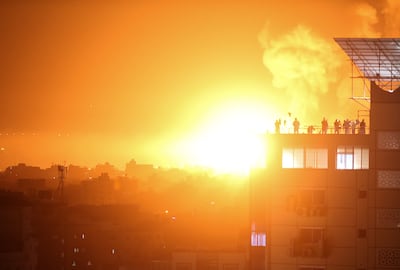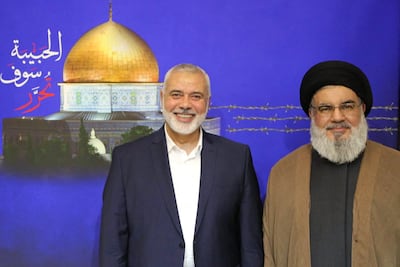In early August, fighting broke out in Lebanon’s largest Palestinian refugee camp, Ain Al Hilweh, after Islamist groups assassinated a leading Fatah security official, Abou Ashraf Al Armouchi. While some linked this to longstanding tensions between Fatah, the main Palestinian faction, and extremist Islamist groups, the message was probably different.
To many analysts in Lebanon, what is happening in the Palestinian camps is tied to regional dynamics, in particular Iran’s efforts to hedge against a widening of normalisation between Arab states and Israel. Recently, there was talk of a possible breakthrough in relations between Saudi Arabia and Israel, particularly a Wall Street Journal article mentioning agreement on “the broad contours of a deal”. While the US State Department played down the newspaper story, Iran cannot have been reassured.
For Tehran, an alignment of Arab states with Israel represents a strategic threat in a region where the Iranians have spent years building up their influence in countries such as Iraq, Yemen, Lebanon and Syria. Evidently, Iran regards its control over the Palestinian card as the cornerstone of an effort to sponsor an alliance of forces opposed to Arab-Israeli rapprochements. Lebanon has taken on a central role in this context.
Not that Iran’s contacts with the Palestinians are new. In the early 1980s, Iran had established ties with Palestinian Islamists in Ain Al Hilweh, a pattern documented in Bernard Rougier’s ground-breaking book Everyday Jihad. The Iranians were also behind what is known as the Association of Muslim Scholars, a grouping of Lebanese and Palestinian Sunni clerics founded in 1982 by Iran’s ambassador in Beirut. It sought to spread what Mr Rougier described as a “revolutionary vision” of Islam, in line with that of the Iranian regime.
While Iranian influence declined somewhat in the early 1990s, as Salafist influence rose in the former pro-Iranian Palestinian Islamist networks, today Tehran and Hezbollah have close ties with Hamas and Islamic Jihad in Ain Al Hilweh. Prominent leaders of both groups have relocated to Lebanon, as my Carnegie colleague Mohanad Hage Ali, who has closely followed developments on the Palestinian front, has written.

Earlier this year, Hezbollah’s secretary general, Hassan Nasrallah, outlined a new strategy that he described as “the unification of fronts” against Israel. What he meant was that Hezbollah, Hamas and Islamic Jihad would co-ordinate their actions on a succession of fronts, from Gaza, through Lebanon, to southern Syria (as well as perhaps the West Bank).
Indeed, in early April, and again in July, an unidentified group fired rockets into Israel from southern Lebanon. The first salvo followed Israeli attacks against worshippers at Al Aqsa Mosque, while the second came after Israel’s major military operation in Jenin.
The Iranian and Hezbollah scheme appears to be advancing on two levels.
The attacks from Lebanon seem to be designed to impose a new deterrence doctrine with Israel, where Hezbollah, Hamas and Islamic Jihad are telling the Israelis that they will face a much more unpredictable and multifaceted reaction to Israel’s military actions in the future, from across the country’s borders. Hezbollah has already thrown into this mix the possibility that in an eventual conflict, pro-Iranian Iraqi Shiite combatants might also be deployed to Lebanon.
On a second level, Hezbollah is trying to erode Fatah’s standing within the Palestinian camps in Lebanon, and the Ain Al Hilweh tensions should be understood in this light. Mr Hage Ali sees Fatah losing on all sides, writing recently in Diwan, the blog of Carnegie’s Middle East programme: “What may be emerging on the regional level is an Arab camp that undermines Fatah by normalising with Israel … and a pro-Iran camp that backs Fatah’s foes.”
There are definite risks here for Hezbollah, not least that the party’s Shiite base does not want to see southern Lebanon again pay a price for the Palestinian cause, as happened between the late 1960s and early 1980s. Nor is Lebanon in an economic condition that would allow it to absorb the heavy destruction from Israeli bombing that a conflict would invariably cause.

However, the interests of the Lebanese are secondary for both Hezbollah and its sponsors in Tehran. The Iranians must have regarded their reconciliation with Saudi Arabia last March as the first real sign of Arab recognition of Iran’s stakes in the Middle East. However, ties have not improved since then as rapidly as some expected, and the recent meeting between Saudi Crown Prince Mohammed bin Salman and Iranian Foreign Minister Hossein Amirabdollahian was widely seen as an effort to inject new momentum into the rapprochement.
An improved relationship does not imply the end of politics. Both sides will continue to try to accumulate means of regional leverage to preserve their power. Gradual control over the Palestinian file would represent a major Iranian gain, especially if the region becomes more polarised over the improvement of Arab-Israeli dealings down the road.
Hezbollah is playing a central role in this complicated regional dance, by supporting Hamas and Islamic Jihad in their endeavour to erode Fatah’s sway inside the Palestinian camps in Lebanon. This comes at a time when morale in Fatah is very low and the organisation’s ageing leadership appears to be increasingly out of touch with Palestinian public opinion. The Iranian and Hezbollah plan is still a work in progress, but expect it to move into higher gear in the near future.


